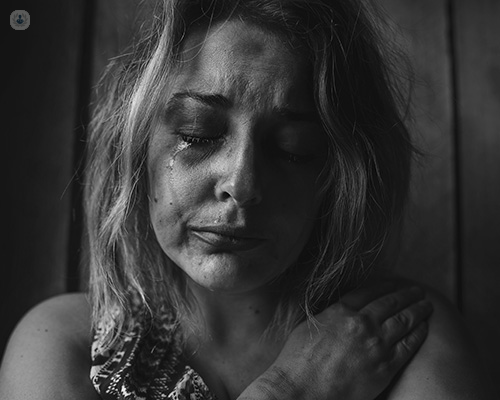Depression – what causes it, how is it diagnosed, and what is the treatment?
Written by:Depression is a common mental disorder, with around 1 in 4 people affected each year in the UK, and globally, more than 300 million people of all ages suffer from depression. It is sometimes referred to as the ‘common cold’ of mental health, and is frequently diagnosed by psychiatrists. Sadly, around 15 per cent of people in the UK that are suffering with depression commit suicide, which equates to one suicide every two hours. In a country such as India, there are approximately 15 suicides per hour. We learn more in this informative article from esteemed consultant psychiatrist Dr Jason Tan.

How is depression diagnosed?
The criteria for diagnosing depression according to the World Health Organization International Classification of Diseases (ICD-10), falls into two groups:
Group 1 symptoms of depression:
- Depressed mood
- Loss of interest and enjoyment
- Reduced energy, increased fatigability (feeling tired more quickly), diminished activity, marked tiredness.
Group 2 symptoms of depression:
- Decreased concentration and attention
- Low self esteem
- Ideas of guilt
- Hopelessness
- Ideas or acts of self-harm or suicide
- Disturbed sleep
- Diminished appetite
Diagnosing mild, moderate, or severe depression
Mild depression is diagnosed in patients with two symptoms from group 1 and two symptoms from group 2.
Moderate depression is diagnosed as being two symptoms from group 1, and three symptoms from group 3.
Severe depression is diagnosed as three symptoms from group 1, and four symptoms from group 2.
What causes depression?
There are a number of theories about the causes of depression, and to how the condition develops in the person.
Behaviourist theory
This theory emphasises the importance of the environment in shaping the behaviour of the individual, therefore depression is a result of a person’s interaction with the environment around them. The theory focuses on observable behaviour, and how behaviour is learnt.
- Classical conditioning
This theory suggests that depression is learned through associating certain stimuli with negative emotional states.
- Operant conditioning
This states that depression is caused by the removal of positive reinforcement from the environment of the person. Things such as losing a job can induce depression.
- Social learning theory
Behaviour is learned through observation, imitation and reinforcement.
Psychoanalytic theory
This theory initially proposed by Sigmund Freud in 1917 suggests that some cases of depression could be linked to feelings of loss or rejection by a parent.
Cognitive theory
This theory suggests that individuals suffering with depression form a set of beliefs about themselves that are negative and pessimistic, usually as a result of a traumatic event.
Learned helplessness
This theory of a cause of depression suggests that depression occurs when a person learns that their attempts to escape a negative situation are unsuccessful and make no difference. This causes the person to become passive and endure negative environments, even when escape is possible.
Humanist theory
This theory suggests that humans have a specific set of needs, such as a need for self-actualisation (achieving our potential), to have a meaningful life. Anything that blocks a person’s strive to fulfil this need can become a cause for depression.
Biological theory
Depression has been linked to imbalances or problems in the brain, such as in the neurotransmitters serotonin, norepinephrine, and dopamine.
What is the treatment for depression?
Depression is treated with a three-pronged approach:
Biological
The prescribing of anti-depressants.
Psychological
Cognitive behavioural therapy (CBT) or cognitive analytic therapy (CAT) are provided to the patient.
Social
Advice is given to the patient to help resolve social issues such as relationships, finances, housing, and employment.
If you or a loved one wants more information regarding treatment for depression, contact Dr Jason Tan, at Dementech Neurosciences, London.


